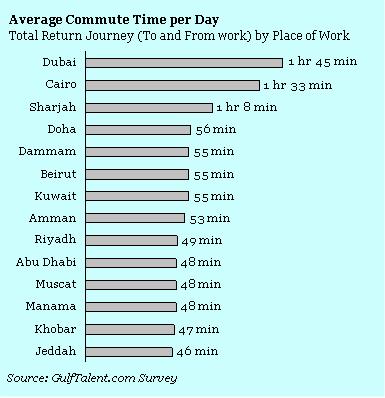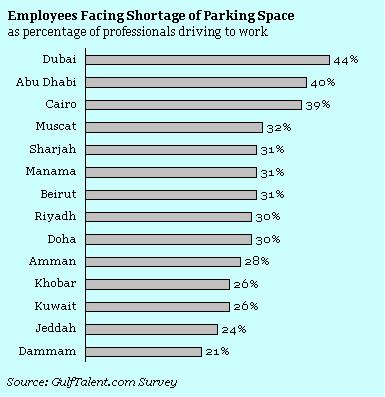Professionals working in Dubai spend 2 hours per day commuting
Dubai is officially the most congested city in the Middle East, according to the latest survey by GulfTalent.com.
The survey, which was conducted last month and released just before the launch of Dubai’s new road toll system (Salik), found that professionals working in Dubai spend on average 1 hour and 45 minutes each day in total commuting time to and from their place of work, the highest figure in the region.
The journey times are particularly long for those commuting to Dubai from neighbouring Sharjah, home to many expatriates working in Dubai. Although just 15 km away and connected to Dubai via two express highways, Sharjah residents working in Dubai reported spending on average 2 hours and 44 minutes for the daily return journey to and from work, much of it in slow-moving bumper-to-bumper traffic. Many reported high levels of stress and fatigue as a result.
According to GulfTalent.com, many employers in the emirate are becoming increasingly concerned at the impact of traffic-related stress and exhaustion on the productivity of their staff.
Cairo came second in the traffic rankings, with total daily commute time at 1 hour and 33 minutes on average.
Jeddah, by contrast, saw the lowest reported commute time, with employees spending on average just 46 minutes each day commuting.

Aware of the traffic problem, the Dubai government is taking drastic measures to reduce congestion by introducing an urban road toll system, the first of its kind in the Middle East. It is also building a modern urban rail system, the Dubai Metro, expected to come into service in 2009.
Parking Shortages
Based on GulfTalent.com’s survey findings, Dubai also tops the list as the city with the most acute shortage of parking space, with nearly half the respondents reporting difficulties in finding parking space near their place of work. Many reported having to leave home much earlier than necessary, to avoid the morning rush and to secure a parking space close to their place of work.
Dammam in Saudi Arabia was the easiest city for finding parking space, with only 21% reporting shortages.

Key Drivers
While Dubai’s traffic and parking problems have been the most acute, all major cities in the region have been experiencing growing congestion.
The recent oil-driven economic boom, combined with greater availability of auto financing and the lack of a modern public transport network, have led to greater demand for private transport and a sharp rise in car ownership across the region. At the same time, spiralling rents have forced many residents to seek cheaper accommodation in more distant locations, further adding to the traffic problem.
The GCC governments have been investing heavily in their road infrastructure, although this has not kept pace with the increase in the number of vehicles, leading to growing problems of congestion. Ironically, some of the investment in transport infrastructure has, in the short term, exacerbated the congestion problem due to ongoing construction work and the associated diversions and road blockages.
According to some traffic experts, Dubai is suffering from an originally flawed road system, with in-built bottlenecks on certain key routes such as the Dubai-Sharjah road. Over time, however, the new infrastructure including transit trains, the new bridges and complex of flyovers is expected to ease congestion to some extent.
A core underlying problem remains that, across much of the region, the development of support infrastructure is lagging behind more prestigious mega-projects such as airports, business parks, and high-rise towers – leading to continuous bottlenecks and disruptions in traffic.
GulfTalent.com’s study was based on a survey of 5,000 professionals in fourteen major cities in the Middle East. The survey was conducted during May 2007 as part of an exercise to understand the key issues affecting employees at work.
